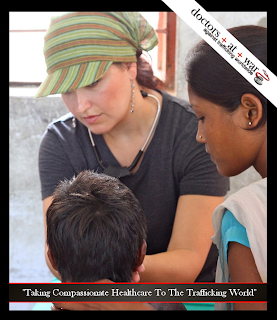We’re thrilled for the release of Trade of Innocents in the fall and want to invite you into our excitement. We’re interviewing people and
organizations on the subject of human trafficking in preparation for the movie.
Perhaps you’ve heard of some of our friends. Maybe some of these names will be
new to you.
Today, we want to introduce
you to Dr. Daniel Bercu from Doctors at War, an organization dedicated to
fighting human trafficking from the medical side:
1. What exposure to human trafficking led to the formation and your
involvement with Doctors at War?
After watching a 48-hour news
show on trafficking, my wife Colette felt led to form a 501©3 non-profit
organization called Freefor Life International to help support shelters doing
restoration work with survivors. As
co-founder of this organization I had a lot of contact with others working in
this arena.
During the George W. Bush era
there was a faith-based initiatives meeting at the White House we attended
every year that brought together nearly everyone working to fight
trafficking. As a physician I was struck
by the extremely small number of doctors that I had met who were involved in
this fight, and as I discussed this with others I realized that the main reason
this was true was because they didn’t have a place to ‘plug-in’ in order to
become a part of the army fighting this growing epidemic. That’s when I decided to form Doctors At War.
2. How would you describe the role of Doctors at War and its impact in the
fight to abolish trafficking?
We have 3 primary branches to
the work we do: Service, Advisory, and
Educational.
As an overview, I would say
that we are an organization that is putting out a call-to-action to healthcare
providers around the world, challenging them to get involved in this fight and
to find innovative ways to make a difference.
Although we are a relatively new organization, I believe our impact can
be transformational. There are thousands
of healthcare workers who have already joined us in the decision to no longer
tolerate the predatory crime of human trafficking on innocent and vulnerable
individuals.
SERVICE: As a healing profession, one focus is to
recognize victims in our daily work and to work hard to provide avenues of
healing and restoration for survivors.
Other areas of focus include building a database of physicians who will
give free care, and humanitarian trips to care for those in need who have been
rescued from this life.
ADVISORY: This can include the
establishment of protocols for care, acting as expert advisors to service
agencies that have specific questions, and helping medical and nursing schools
add a module on trafficking to their curriculum.
EDUCATIONAL: Areas we work in thus far include providing
educational tools, speaking, writing articles, organizing focus groups,
developing opportunities for residents, engaging in research.
3. What surprised you the most in learning about human trafficking?
Many things have been a
surprise, including how this epidemic has exploded nearly unnoticed by the good
people of this world. But I think the
most amazing realization I have had is to understand that we are in the early
days of this battle, and each of us can use our creativity and passion to truly
become a groundbreaker at such a time as this in history. The significance of this cannot be
overstated.
4. How has your vision been shaped in this process?
Well, I think my vision has
always been large from the beginning.
Still, the more I experience, the bigger that vision has become. We currently have healthcare volunteers in
over 30 countries! Surprisingly, many
are from the Middle East.
5. How can the average citizen get involved with Doctors at War or help in
the fight against human trafficking?
The possibilities are
endless. We truly need an army, which
includes a large contingency of individuals who are not healthcare
professionals. IDEAS : Put on a fundraiser, start a
Doctors At War chapter, recruit healthcare providers you know to join in our
work, goon a humanitarian trip to care for survivors, help us
put together newsletters, language tools, and videos that will help us tell our
story just to name a few.
6. What is one of your favorite memories from your time with Doctors at
War?
There are so many! One of them is presenting our Multilingual
Phrasebook (with medical and human trafficking questions in 47 languages) to
the annual meeting of task force members in Washington, D.C. This was a group of 1,000 individuals working
on the front lines across the country, and we were honored to have it so well
received by these experts.
And since it is fresh on my
mind, we just got a request for a dentist to take care of a trafficking
survivor in Washington D.C. We connected
her with both a dentist AND an oral surgeon.
This was a blessing for us, for the NGO that contacted us, for the
dentists and staff, and most importantly for the young woman who is starting
down the road to restoration and needs to know that there are many out here who
will surround her with the love and support she needs in order to turn her pain
into victory. We love to offer practical
help that is tangible and can make a difference in an individual’s life.
7. What is your favorite hobby to do on a free afternoon?
Well, as a physician, medicine
is still a passion in my life. I enjoy
continually learning. Aside from our
non-profit work though, you might find my wife and I wandering through the huge
FleaMarket at the Nashville, Tennessee
Fairgrounds looking for an antique find!
Thank you, Dr. Daniel, for sharing Doctors at War’s story with us!




No comments:
Post a Comment